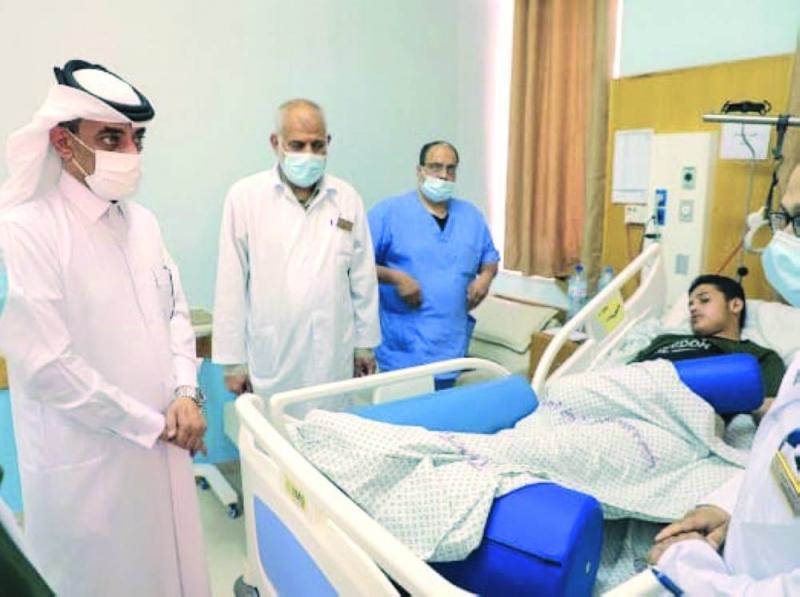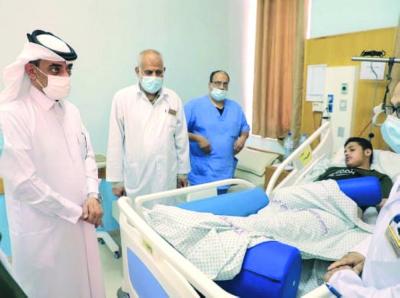Dr. Khaled Abdel Hadi, head of the medical delegation that visited Sheikh Hamad bin Khalifa Al Thani Hospital for Prosthetics and Rehabilitation in Gaza, confirmed that the Qatar Development Fund is overseeing the hospital's services on a daily basis and is working on enhancing them to help the people of Gaza receive the best therapeutic care in specialized fields, including rehabilitation, prosthetics, and audiology.
In a special interview with Al-Sharq, the head of the delegation and Vice Chairman of the Hospital's Board of Directors stated that the recent visit aimed to accomplish several objectives, the most important of which was training medical staff on the installation of upper limb prosthetics. The number of beneficiaries increased to 30 from an initial target of 20, which raises both costs and efforts. Installing prosthetics for this large number in a short time with high technique and efficiency is a significant achievement in the Middle East.
Additionally, there was a focus on training personnel on balance devices; the Qatar Development Fund established a special clinic for patients with balance and dizziness issues, a service that was not previously available in the Gaza Strip.
Training medical staff continued with the provision of devices and the training of personnel in the audiology and balance department, which offers services for all age groups. The team examined some patients and trained staff on how to handle their cases, and an official clinic will be opened for referrals from other hospitals for patients complaining of dizziness or vertigo.
Dr. Khaled explained that another goal of the visit was to equip 50 children annually with cochlear implants, funded by the Ministry of Awqaf and Islamic Affairs in Qatar, with the number potentially increasing over a 3-year period, based on an agreement with Hamad Medical Corporation and the Qatari Cochlear Implant Program. He noted that Qatar’s goals during its delegations' visits to Gaza are continuously evolving concerning support for the Palestinian people, but the follow-up is daily and not just linked to visits.
It is worth mentioning that Hamad Hospital has previously performed cochlear implants for 180 cases. Dr. Khaled affirmed that Qatar is always keen on supporting the Palestinian people, especially in Gaza, with the leadership of the Qatar Development Fund and the Gaza Reconstruction Committee.
### Specialized Clinics
The Vice Chairman of the Board of Directors revealed that Hamad Hospital has established a number of distinguished clinics offering specialized services, accommodating many patients. These clinics include: stroke rehabilitation clinic, brain and spinal cord injury rehabilitation clinic, neurology rehabilitation clinic, amputation rehabilitation clinic, musculoskeletal rehabilitation clinic, urology clinic, and bladder rehabilitation for individuals with disabilities. This initiative comes after noting the lack of specialization in Gaza for many years, and for the first time, they will work in cooperation with a consultant physician to address issues accompanying motor disabilities, as well as a pediatric rehabilitation clinic and the “Hope Clinic,” which aims to reduce pain for patients with disabilities, a modern specialty globally. There is currently only one such clinic in Gaza that cannot cover all cases, thus the new clinic will alleviate the suffering of patients with chronic pain in joint areas, lower back, neck, and in amputation cases.
### Meeting the Needs of the People of Gaza
Dr. Khaled emphasized that all of this is based on the recommendations from the Qatar Development Fund, which strives to meet the needs of the people of Gaza through the Prince Father’s Hospital amid the challenges faced by Palestinians in accessing services. The head of the delegation expressed his affection for Gaza and its people, describing them as generous despite their simplicity and harsh conditions. He noted that they appreciate the significant services being offered, expressing his feelings towards the 180 children who received cochlear implants alongside Dr. Abdul Salam Al-Qahhtani, considering him like a father figure, and that when he leaves for Qatar, it feels as if he is leaving his own children. This sentiment is echoed by many families of the children, who often express their children's great love for him, as he is the first voice they hear reaching their ears.




